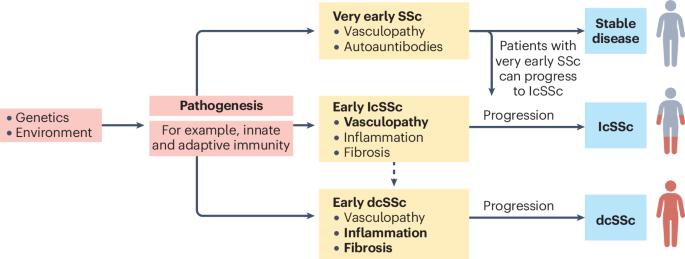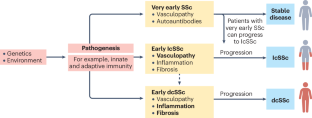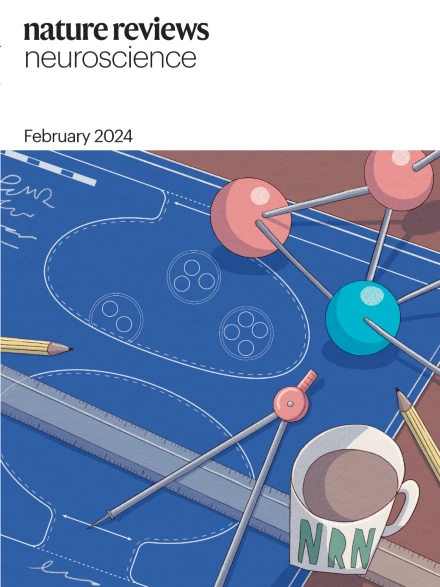An international perspective on the future of systemic sclerosis research
IF 32.7
1区 医学
Q1 RHEUMATOLOGY
引用次数: 0
Abstract
Systemic sclerosis (SSc) remains a challenging and enigmatic systemic autoimmune disease, owing to its complex pathogenesis, clinical and molecular heterogeneity, and the lack of effective disease-modifying treatments. Despite a century of research in SSc, the interconnections among microvascular dysfunction, autoimmune phenomena and tissue fibrosis in SSc remain unclear. The absence of validated biomarkers and reliable animal models complicates diagnosis and treatment, contributing to high morbidity and mortality. Advances in the past 5 years, such as single-cell RNA sequencing, next-generation sequencing, spatial biology, transcriptomics, genomics, proteomics, metabolomics, microbiome profiling and artificial intelligence, offer new avenues for identifying the early pathogenetic events that, once treated, could change the clinical history of SSc. Collaborative global efforts to integrate these approaches are crucial to developing a comprehensive, mechanistic understanding and enabling personalized therapies. Challenges include disease classification, clinical heterogeneity and the establishment of robust biomarkers for disease activity and progression. Innovative clinical trial designs and patient-centred approaches are essential for developing effective treatments. Emerging therapies, including cell-based and fibroblast-targeting treatments, show promise. Global cooperation, standardized protocols and interdisciplinary research are vital for advancing SSc research and improving patient outcomes. The integration of advanced research techniques holds the potential for important breakthroughs in the diagnosis, treatment and care of individuals with SSc. The diagnosis, treatment and management of systemic sclerosis (SSc) remains challenging, owing to the complexity of this disease. In this Perspective, an international group of experts discuss the future of SSc research and how the advent of innovative technologies will advance research into and understanding of SSc.


系统性硬化症研究未来的国际视角
由于其复杂的发病机制、临床和分子异质性以及缺乏有效的疾病改善治疗,系统性硬化症(SSc)仍然是一种具有挑战性和神秘的系统性自身免疫性疾病。尽管对SSc进行了一个世纪的研究,但SSc中微血管功能障碍、自身免疫现象和组织纤维化之间的相互关系仍不清楚。缺乏有效的生物标志物和可靠的动物模型使诊断和治疗复杂化,导致高发病率和死亡率。过去5年的进展,如单细胞RNA测序、下一代测序、空间生物学、转录组学、基因组学、蛋白质组学、代谢组学、微生物组谱和人工智能,为识别早期发病事件提供了新的途径,一旦治疗,可能会改变SSc的临床历史。整合这些方法的全球合作努力对于开发全面的、机制的理解和实现个性化治疗至关重要。挑战包括疾病分类、临床异质性和建立疾病活动和进展的强大生物标志物。创新的临床试验设计和以患者为中心的方法对于开发有效的治疗方法至关重要。包括基于细胞和成纤维细胞靶向治疗在内的新兴疗法显示出了希望。全球合作、标准化协议和跨学科研究对于推进SSc研究和改善患者预后至关重要。先进研究技术的整合有可能在SSc患者的诊断、治疗和护理方面取得重大突破。
本文章由计算机程序翻译,如有差异,请以英文原文为准。
求助全文
约1分钟内获得全文
求助全文
来源期刊

Nature Reviews Rheumatology
医学-风湿病学
CiteScore
29.90
自引率
0.90%
发文量
137
审稿时长
6-12 weeks
期刊介绍:
Nature Reviews Rheumatology is part of the Nature Reviews portfolio of journals. The journal scope covers the entire spectrum of rheumatology research. We ensure that our articles are accessible to the widest possible audience.
 求助内容:
求助内容: 应助结果提醒方式:
应助结果提醒方式:


